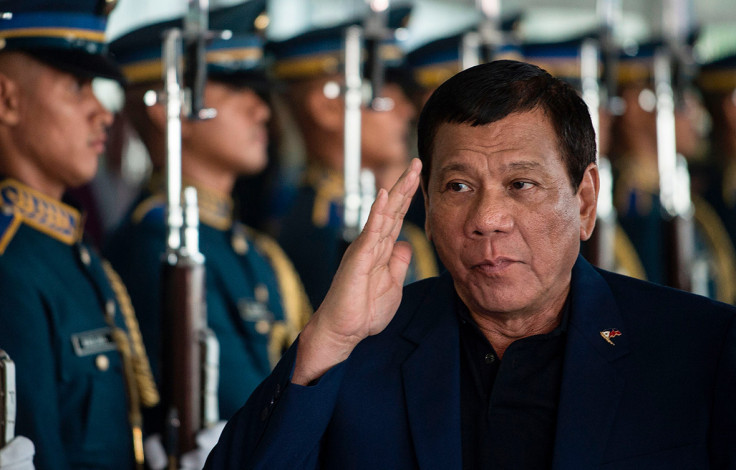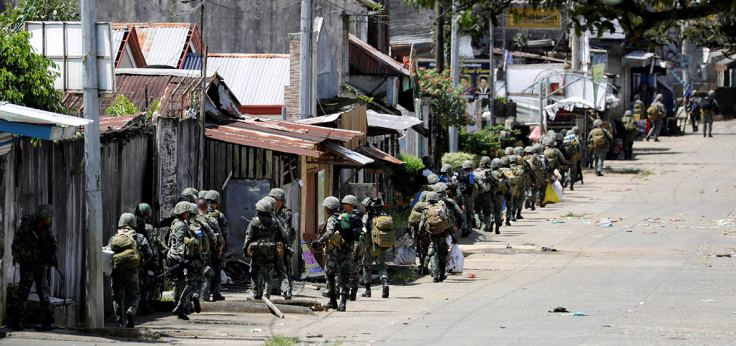Has Philippines' macho President Duterte been humiliated by Isis Marawi siege?
US forces join battle for Marawi as Filipino military suffers heavy losses.
Philippine President Rodrigo Duterte likes to talk tough. His presidency has been defined by a series of policies and statements that have been startlingly aggressive and confrontational. Most notable thousands of alleged drug dealers have been summarily executed in the streets by police and vigilantes in an unprecedented purge whipped up by the populist president, that has shocked world opinion.
However, the growing debacle over the siege of the southern Philippines city of Marawi - now in its third week - is tarnishing his macho reputation as a man of action.
Indeed, news that the US is now supporting the stuttering battle to recapture the city from Isis-linked militants is a new blow to the bullish president's image.
Days before fighters from Abu Sayyaf entered Marawi, Duterte warned to Islamists saying he would eat them alive. He said: "Just give me vinegar and salt, I'll eat you. That's true, and I'll eat his liver."
He added: "The terrorists cut other people's throat, slit it. They are animals. If you want me to be an animal, I am used to that. We are alike. I can dish out more than what you can 50 times over."
However, his soldiers have struggled to carry out the outlandish threats and on Saturday (June 10) 13 Philippine marines were killed in the biggest single-day loss for government forces, officials said.
Meanwhile, the need for US military support to bolster the Filipino army's slow progress in liberating Marwai, is in stark contrast to Duterte's string of insults aimed at Washington and American politicians by the fiery president.
In September, Duterte was been forced into an embarrassing U-turn over inflammatory comments he made saying US troops based in the country needed to leave.
Duterte, who has made a series of rhetorical attacks against the US – the Philippines longest-standing military ally – retracted his statement that the southern Philippines "would never have peace" while allied with Washington.
He attacked the US over atrocities under American colonial rule and said troops stationed in the south of the country have impeded counter-insurgency efforts against the Islamic-State linked group Aby Sayyaf.
Thus, it was with some irony that it as now emerged that US forces are helping Philippines to battle the Isis-linked fighters entrenched in Marawi.

A US Navy aircraft provided surveillance for the local troops as the battle raged, confirming the involvement of the US military in helping to end the urban insurrection at the request of the Philippine government, Philippine military officials said.
An Associated Press journalist and photographer saw a US Navy P3 Orion plane hovering in cloudy skies above Marawi on Friday. The aircraft flew above rocket-firing Philippine helicopters that struck militant positions, causing plumes of smoke to billow skyward.
"We don't have adequate surveillance equipment, so we asked the US military for assistance. It's noncombat assistance," military spokesman Brig. Gen. Restituto Padilla said by phone, citing a Philippine government policy that bars foreign troops from local combat.
The US Embassy in Manila said without elaborating that special operations forces were providing help to Filipino troops battling the Maute and Abu Sayyaf militants in Marawi.
"The United States is a proud ally of the Philippines, and we will continue to work with the Philippines to address shared threats to the peace and security of our countries, including on counterterrorism issues," the embassy said in a statement.
Duterte was, however, reluctant to admit his forces needed US help. He said on Sunday (June 11) he was not aware the US government was providing assistance to government troops in its battle against Islamist militants in a southern city.
Duterte added he "never approached America" for help.
Temporary setback?
Philippine marines were conducting a house-to-house search for militants allied with the Islamic State group who are still occupying parts of Marawi when the battle erupted Friday, said Lt. Col. Jo-ar Herrera, spokesman for the Philippine army's 1st Infantry Division.
About 30-40 militants used civilians as human shields, making it hard for troops to operate, and also positioned themselves in the city's many mosques.
Forty other marines were wounded, Herrera said.
Philippine military officials say the violence has left at least 138 militants and 58 government troops dead. At least 21 civilians have been killed, including a boy who was hit by suspected militant gunfire inside a Marawi mosque where his family had taken refuge, Padilla said.
Hundreds of thousands of people have fled the city, parts of which were reduced to rubble by fighting and government airstrikes in an attempt to dislodge the rebels.
"This temporary setback has not diminished our resolve a bit," said military spokesman Col. Edgard Arevalo. "It instead primed up our determination to continue our prudent advances to neutralize the enemy, save the innocent lives trapped in the fight, and set the conditions for the rehabilitation and reconstruction of Marawi."

Filipino forces, meanwhile, captured on Friday the mother of two top militant leaders leading the siege. Ominta Romato Maute, who is also known as Farhana, was arrested with two wounded men and several woman allegedly with assault rifles and other weapons in Masiu town in Lanao del Sur province.
Maute's husband, Cayamora, was arrested at a police checkpoint in the southern city of Davao on Tuesday. The two were detained on suspicion of providing financial and other support to their children who are involved in the fighting in Marawi, officials said.
Duterte has declared martial law in the Mindanao region, the southern third of the Philippines and home to a decades-long Muslim separatist rebellion.
Defense Secretary Delfin Lorenzana, the designated administrator of martial law, has ordered the arrest of nearly 200 militants, politicians and other suspected civilian backers of the unprecedented uprising in Marawi, the mosque-studded heartland of Islamic faith in the south of the predominantly Roman Catholic nation.
The Marawi siege followed a May 23 army raid that failed to capture a top terror suspect, Isnilon Hapilon, who has been designated by the Islamic State group as its leader in Southeast Asia.
© Copyright IBTimes 2025. All rights reserved.





















